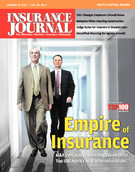Insurance Considerations for Agents Insuring Agricultural Employers
Every state has been impacted by Arizona’s immigration law, as there is now a cry for immigration reform. Employers who hire a questionable workforce due to the “dirty” or menial nature of certain jobs can expect additional scrutiny.
Border states and states near open water are easy targets for Border Patrol. In upstate New York for example, federal agents are boarding trains and buses up to 100 miles from the border, asking passengers for documents. Florida’s newly elected Attorney General Pam Bondi stated publicly that she supports an Arizona style law. Transportation and entertainment hub Las Vegas was most recently swept in August 2010 for illegal aliens.
Risks are increasing especially because the federal government is stepping up its efforts to enforce the laws currently on the books to punish offending employers, rather than resorting to new legislation. To respond to the political will, Immigration Control and Enforcement, known as ICE, has stepped up its auditing of the Form I-9, Employment Eligibility Verification.
ICE Chief John Morton, during a trip to California, said, “You are going to see audits regularly and on a larger scale. You will see the resuscitation of … civil fines.”
Raymond R. Parmer Jr., acting special agent in charge of the ICE Office of Investigations in New Orleans, also stated that “ICE is committed to establishing a meaningful I-9 inspection program to promote compliance with the law. This effort is a first step in ICE’s long-term strategy to address and deter illegal employment.”
To further those efforts, ICE issued Notices of Inspection to 180 businesses in Louisiana, Mississippi, Alabama, Arkansas and Tennessee, indicating that ICE would inspect their Form I-9s to determine whether the forms comply with the employment eligibility verification laws and regulations. As a result of an I-9 audit, national retailer Abercrombie & Fitch was just fined $1 million for I-9 violations. There is no viable insurance product to pay for fines that result from such violations of the law.
I-9 audits encompass more than just an employer’s own data; ICE is demanding information about the employer’s use of temporary staffing agencies and independent contractors, requesting all contracts between the employer and the vendor and a copy of all applications and I-9s filled out by the vendor’s employees who have been assigned to the employer’s workplace. No one is exempt from scrutiny. Walt Disney World was sued in 2010 for Disney’s labor contractor’s failure to pay wages.
To ensure proper risk management, insurance agents need to know of the good, the bad and the ugly that could snare their clients.
E-Verify
Employers are considering using E-Verify as a way to reduce hiring issues. E-Verify is an Internet-based system that allows employers using information verified on an employee’s I-9 to determine the eligibility of that employee to work in the United States. E-Verify is not the panacea for all ills — it has limitations due to human error issues associated with data entry.
Employers using E-Verify complain of tentative non-confirmations and false negatives, high error rates, and fraud; civil rights groups complain of industries unlawfully using E-Verify to pre-screen applicants. An employee’s failure to contest a tentative E-Verify non-confirmation results in his or her termination as employers must terminate the employment of any individual who receives a final non-confirmation. While workers are resolving E-Verify issues, crops are not harvested, cattle are not monitored, and produce and meat are not packed.
How do these employment-related immigration issues affect those in the insurance business?
Clients will be looking to insurance agents for guidance on properly managing risks, in purchasing appropriate insurance, and for assistance on investigating and denying claims based on applicable state law. Agricultural, ranching and packinghouse employers, for instance, may seek an agent’s opinion about how to ensure a stable and available workforce throughout their seasons. Employers also should be rightfully concerned that a pattern and practice discrimination claim might be established based upon a failure to hire groups of people as race or national origin issues affect agricultural hiring.
If an employer, or potential employer, doesn’t handle employee verification properly and makes hiring decisions without following the required process, and then the affected potential employee who is legal for hire seeks damages, that would be addressed under most employment practices liability policies.
H-2A
The H-2A program provides a way for agricultural employers who anticipate a shortage of domestic or U.S. workers to bring non-immigrant foreign workers to the United States to perform agricultural labor or services of a temporary or seasonal nature. While this seems simple enough, there are many traps for the unprepared and unwary.
Before the U.S. Citizenship and Immigration Services (USCIS) can approve an employer’s petition to bring in H-2A workers, the employer must file an application with the Department of Labor (DOL) stating that there are not sufficient U.S. workers who are able, willing, qualified and available — and that the employment of aliens will not adversely affect the wages and working conditions of similarly employed U.S. workers.
Domestic U.S. workers who work in the same environment as H-2A workers must be paid the DOL’s calculated prevailing rate instead of minimum wage or piece rate. The DOL determines the “prevailing rate” for the services to be provided. This rate is usually more than a dollar over minimum wage and is not a federal- or state-determined rate but a county-by-county-determined rate. H-2A employees are not subject to the regulations under the Federal Unemployment Tax Act (FUTA), State Unemployment Tax Authority (SUTA) and Federal Insurance Contributions Act (FICA).
After H-2A workers are recruited, employers must continue to engage in “positive recruitment” of U.S. workers. H-2A workers can only work for the employer whose completed packet was approved by the DOL.
H-2A workers are entitled by law to:
- Guaranteed employment of at least 3/4 (75 percent) of the total hours promised in the work contract.
- Employers must provide transportation and per diem from the employee’s country of origin to the employer’s worksite, or the employer must reimburse those costs.
- Every state the H-2A workers travel through once across the U.S. border must be listed in section 3(a) or 3(c) on the workers’ compensation policy to ensure accident coverage during the transport.
- All employer-provided transportation must meet strict safety standards. All drivers must be properly insured and licensed.
- Accurate written information about the wages, hours, working conditions and benefits of the employment being offered must be provided to employees in a language understood by the worker prior to the worker getting a visa, and no later than the first day of work.
- H-2A workers are to be paid at least twice per month at the contracted wage rate.
- Any deductions not required by law must be explained in writing. All deductions must comply with the laws regarding the few acceptable deductions. Written records documenting the reasons for any deductions must be kept along with the payroll records for three years from the date of certification, or from the date of the determination if the application is denied or withdrawn.
- Each H-2A worker must receive an itemized written Statement of Earnings for each pay period.
- Employers must provide transportation from employer-provided housing to the employer’s various worksites. “Coming and going” time is not usually compensable, but if significant “wait” time at the worksite is required, employers may have to pay for that time.
- Housing is to be provided to H-2A workers at no cost to the H-2A worker. Housing must be in compliance with a long list of necessary requirements, such as mandatory inspection requirements, the duty to ensure hot and cold running water, pest control, maximum occupancy limits, and fire code compliance. Failure to ensure compliance with those requirements will result in hefty fines to the employer.
- The “bunkhouse rule” regarding compensability of reasonable use of the property applies. This “rule” results in 24 hour per day coverage for anyone living in employer-provided housing. The rule presents additional exposures for the insurance providers, because activities in mandated-furnished housing could be job-related.
- Workers must be provided a kitchen and transportation to a grocery store, or the employer must provide meals at a reasonable cost to employees. Insurance coverage should be procured to protect against any potential liability that could result from accidents during such trips.
- Employers must cover all H-2A workers under the state’s workers’ comp insurance program.
- Upon completion of the time period specified in the application, the employer must pay for the H-2A worker to return to his or her home country.
- If a H-2A worker leaves employment prior to completing the contract period, the employer must notify ICE immediately of the employee’s departure. The employer is still responsible for return travel fees, and for payment of any earned wages for the departed employee. ICE may demand proof that such funds are available to the employee; an escrow account for such funds should be considered.
- Employers should keep check lists and conduct internal audits for compliance.
Employment related immigration issues are ever-changing due to the political climate. Because the appetite for enforcement against employers is based in part on the political mood, employers need to fully explore all avenues to ensure an available and consistent workforce. With careful planning and risk management, the H-2A program is worth exploring.
However, insurance agents need to be aware of how to manage the risks. Visit www.uscis.gov for more information.
Topics USA Agencies Legislation Commercial Lines Business Insurance Agribusiness
Was this article valuable?
Here are more articles you may enjoy.


 US Home Insurance Still Priced Too Low for Climate Risk, Says Swiss Re Chair
US Home Insurance Still Priced Too Low for Climate Risk, Says Swiss Re Chair  As Rates Rise, Majority of Homeowners Say Insurance Industry Is in Crisis: Survey
As Rates Rise, Majority of Homeowners Say Insurance Industry Is in Crisis: Survey  Supreme Court Overturns Chevron Rule in Blow to Regulators
Supreme Court Overturns Chevron Rule in Blow to Regulators  Coverage Needed: Hundreds of Thousands in SE Now in Flood Zones With New Maps
Coverage Needed: Hundreds of Thousands in SE Now in Flood Zones With New Maps 


